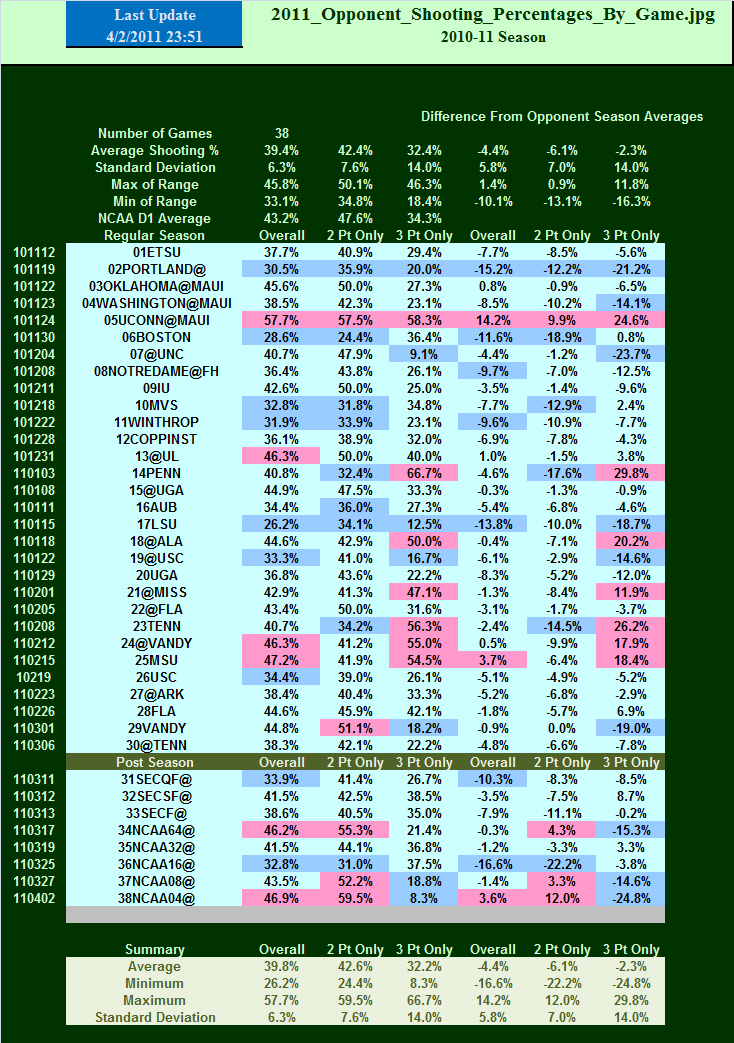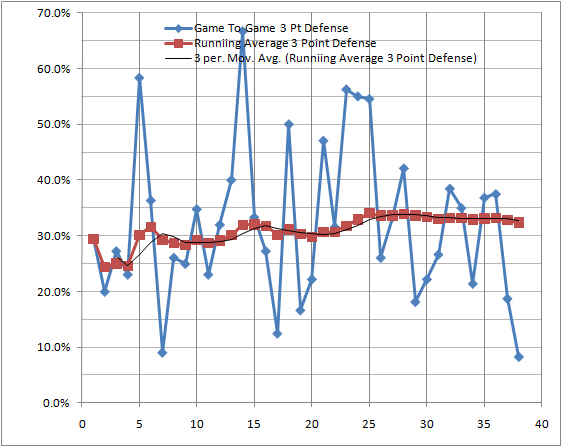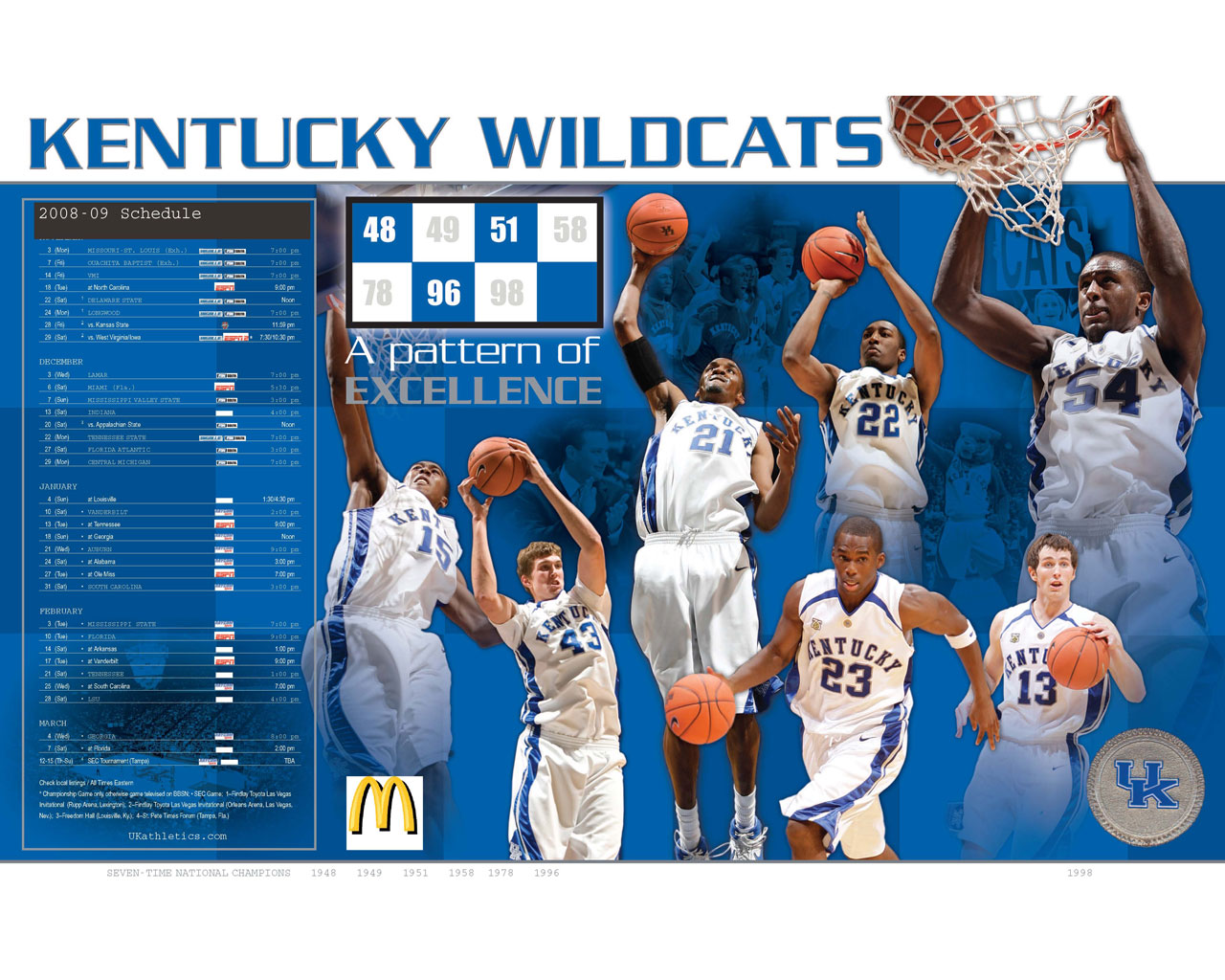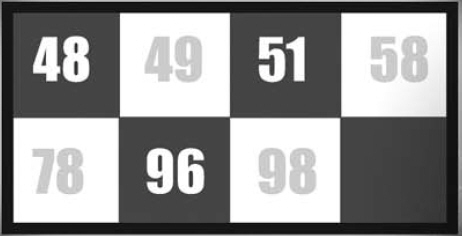BIG BLUE FANS FOR

BASKETBALL
2010-11 Season Analytical Writings
30A
WHAT IS WRONG WITH UK'S PERIMETER DEFENSE?
Through the first 20 games, the UK defensive efficiency was among the best in the nation at 0.902 points per possession allowed all opponent, but since that time, the defensive efficiency has gone in the tank, and the season average has increased to 0.937 ppp and is now rated as #26 by Pomeroy following the Mississippi State game last night. That change, this late in the season, is precipitous, and alarming.
Yes, the last three opponents have each shot lights out from outside the 3 point arc, hitting 9-16, 11-20, and 12-22 respectively, and 32-58 collectively. Is this due to a change within the team that is affecting the perimeter defense, or is it simply a coincidence that can occur over the course of 25 games against quality opposition. The following Table may provide some insight to answer this question.

The light blue blocks are those games in which opponents' shooting percentages were within +/- one Standard Deviation Unit of the Mean UK Defense [first 3 columns] or within +/- one Standard Deviation Unit of the Mean Deviation for the opponent against UK's defense and their average shooting percentages for the season. The pink cells are those games in which the opponent's shooting exceeded that +/- one SDU, and the dark blue cells are those games in which the opponent's shooting percentages fell below that range.
Overall Shooting:
UK has limited it 25 opponents to 39.0% shooting with a SDU of 7.1%. This is quite good, in anyone's book. There have been 4 games in which the opponent outshot the range, and 4 games in which the opponent under shot the range. It just occurs that 2 of the 4 over shooting examples have occurred in the last two games. Four games outside the +/- one SDU range at each extreme in 25 games does not seem excessive.
It is one thing to consider the raw game by game shooting percentages, but another to consider how the opponent's performance against UK's defense compares to the opponent's own season shooting. As you can see in this Table, UK's defense on average has held all opponents to an average of 4.7% under their season shooting percentages, with a Standard Deviation of 6.3%. Therefore, the vast majority of opponents will shoot between +1.6% and -11.0% of their season average when they play against UK this season. There have been 2 games in which the opponent shot above that range, and 3 games in which the opponent shot below that range. As noted above, these events of major deviation do not sound an alarm for me.
Three Point Shooting [Perimeter Defense]:
UK has limited it 25 opponents to 34.0% shooting with a SDU of 15.4%.
This places the working range for this analysis between 18.6% and 49.4% The magnitude of the Standard Deviation for three point shooting defense is larger than I would have expected. There have been 6 games in which the opponent outshot the range, and 3 games in which the opponent under shot the range. Three of the 6 over shooting examples have occurred in the last three games. Nine games outside the +/- one SDU range at both extremes in 25 games does not seem excessive, but the skew toward over shooting at the very least should raise a caution flag up the pole..
UK's defense on average has held all opponents to an average of 1.3% under their season shooting percentages, with a Standard Deviation of 16.0%. Therefore, the vast majority of opponents will shoot between +14.7% and -17.3% of their season average when they play against UK this season. There have been 6 games in which the opponent shot above that range, and 4 games in which the opponent shot below that range. While the caution flag has already been hoisted, I would send out a general alarm when I see that the last 3 opponents have out shot their season average from behind the arc by 23.8%, 16.3%, and 20.6%.
Two Point Shooting [Interior Defense]:
UK has limited it 25 opponents to 41.1% shooting with a SDU of 7.5%.
This places the working range for this analysis between 34.6% and 48.6%. While the magnitude of the Standard Deviation for three point shooting defense is larger than I would have expected, find the consistency with the interior defense surprisingly good. There have been 5 games in which the opponent outshot the range, and 3 games in which the opponent under shot the range. None of the 5 over shooting examples have occurred in the last three games. Eight games outside the +/- one SDU range at both extremes in 25 games does not seem excessive.
UK's defense on average has held all opponents to an average of 7.0% under their season shooting percentages, with a Standard Deviation of 5.8%. Therefore, the vast majority of opponents will shoot between -1.2% and -12.8% of their season average when they play against UK this season. There have been 2 games in which the opponent shot above that range, and of those two games, UConn is the only opponent this season to shoot better from the interior than they have performed on their season to date. There are 3 games in which the opponent shot below that range.
Conclusions:
Based on this data, it is my opinion that this team's defense against shooting has been quite good, and quite consistent, except for the inconsistency noted above relative to perimeter shooting. As I noted at the outset, there was little cause for concern even with three point defense through the first 20 games, and this is illustrated with the following graph:

As I have pointed out before, one game does not a trend make. I do not believe that 3 games make a trend either, but 3 games do signal a basis for reexamining conditions, to identify possible emerging trend changes. However, 5 or more games do establish a trend. The last 5 games are marked by a steady and substantial increase in the average 3 point shooting defense. In my opinion, something has changed with this team relative to its perimeter defense. Coach Calipari needs to identify the cause of this change, and reverse it forthwith.
Submitted by Richard Cheeks


Submitted by Richard Cheeks
![]()
To Cats Look For Intensity and Urgency Against South Carolina
Go Back
Cats Hold Off Mississippi State, Move to 18-7; 6-5
Copyright 2010
SugarHill Communications of Kentucky
All Rights Reserved